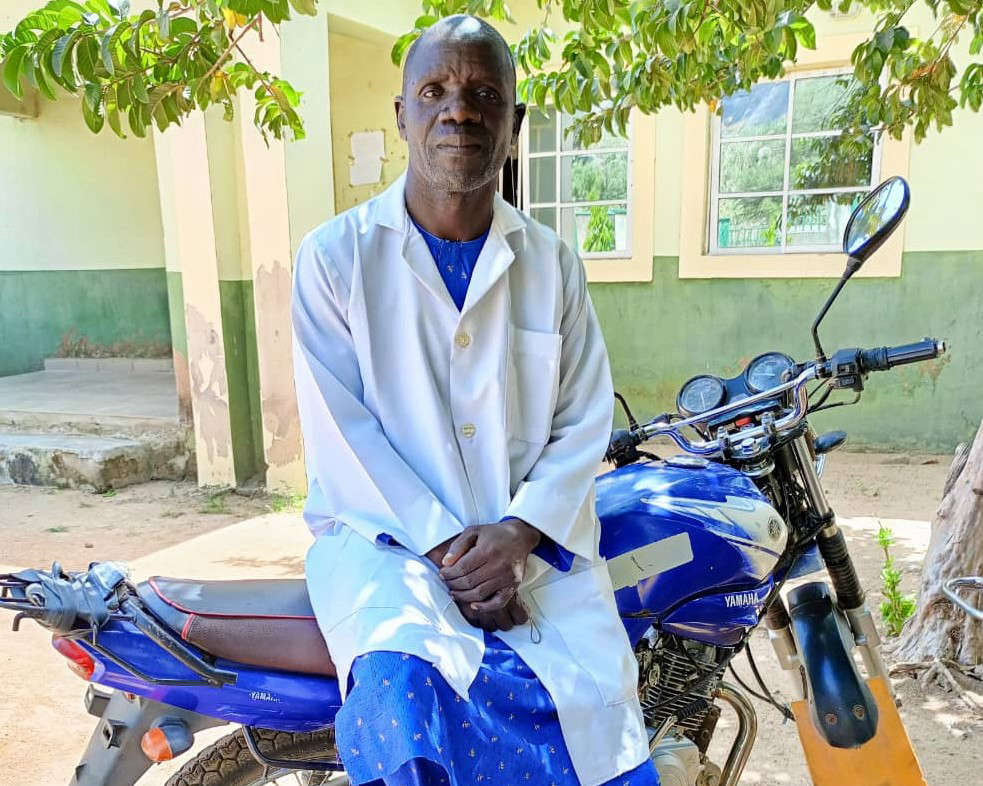
It was 6 am when a man rushed his laboring wife from Galinga Ward in Madobi Local Government Area (LGA) of Kano State into Panshekara Primary Health Centre in Kumbotso LGA.
The female health worker who ran the night shift had already left work. But the in-charge was available to take delivery. The laboring woman’s husband refused because the in-charge was male. For about two hours, the refusal held fast, and the pregnant woman continued in labor, awaiting the midwife.
“When a midwife eventually arrived, she discovered that the woman had complications and referred her to Murtala Muhammed Hospital,” said Suleiman Dau, formerly a pharmacist at the center before his deployment to the Kano State Primary Health Care Agency. “She died inside a tricycle on their way to the hospital.”
The number of female skilled birth attendants is inadequate - and that is linked to the gender imbalance in the health sector. But a growing number of barriers - some socio-cultural, others religious - are also hampering efforts to improve maternal health services, and their delivery, in Nigeria.
These factors could sometimes be fatal at the Primary Health Care (PHC) facilities in some parts of northern Nigeria where men are restraining their wives from accessing medical care through male healthcare providers. They can also be disempowering. And, health workers are reporting incidents that stop them from delivering care.
Divorced for Getting Delivered by a Male Doctor
In one incident in Katsina, a man divorced his 14-year-old wife. His reason? She let a male doctor attend to her during childbirth. The executive director of a Sokoto-based non-governmental association, Nana Women and Girls Empowerment Initiative, Dr. Fatima Adamu, confirmed the incident at the Human Resources for Health Production Dialogue in Abuja.
Dr. Adamu shared more experience in an exclusive interview. “A husband once told me that he sent his wife for ESD and when he was looking through the window, he saw how a male worker was touching his wife here and there; he felt jealous and wanted to attack the man.”
Sorry, Don't Touch the Blood Pressure
The simplest of tasks like taking vitals at health centers is cause for controversy. In Kebbi State, Ahmed Danfari, the Second In-Charge (2-IC) at Kalgo PHC, said it is more like a taboo for male workers to check women’s blood pressure in some facilities.
“Most men are not comfortable with us treating their wives,” said Danfari. “We can’t even check their BP; this is why a hundred percent of our staff at the maternity and family planning sections are female.”
Corroborating his claim, Adisa Umar, a former In-Charge of maternity at Takalau PHC, narrated her encounter with a woman who insisted that a male worker must not touch her arm to take a blood pressure reading. Despite this resistance in rural areas, the female workers who could salvage the situation are being deployed massively to Kebbi’s urban areas to the detriment of the conservative villagers.
While female health workers are moving to urban areas, it is left to males to replace them. “Male workers are mostly sent to villages because married women in the cities are not willing to abandon their families,” explained Aishatu Magaji, the 2-IC of Badariya PHC in Kebbi State.
The dynamic is behind a drift of midwives concentrated in urban areas, reports civil society organizations.
Half of all Midwives in Northern Nigeria Reside in State Capitals
Civil society organizations working with health workers note what they call a “benevolence bias,” which associates women with vulnerability. Dr. Adamu’s organization surveyed female health workers to get to the bottom and found that 50 percent of midwives in northern Nigeria resided in the state capital. “In our recent survey, many female health workers said they cannot go to villages to take care of another man’s wife and leave their husbands to marry new wives before they return,” she said.
By implication, this development is contributing to the alarming Maternal Mortality Ratio (MMR) of more than 1000/100,000 live births in northern Nigeria, according to the BMC Pregnancy and Childbirth survey. The survey also highlighted that in Kebbi State alone, 71 percent of pregnant women never attended antenatal care; 91 percent of the women delivered at home, while less than 10 percent had skilled birth attendance.
Several attempts to interview the Executive Director of the Kebbi State Primary Health Care Development Agency, Abubakar Atiku Kende, on these frightening statistics and other gender imbalance issues in the state were unsuccessful. Kende requested a formal letter before granting the interview and after the letter was provided within 24 hours, he kept citing busy schedules on several occasions for about two months before this report was filed.
Only-Female Admissions to Address Imbalance
One attempt to address gender imbalance among health workers is to shore up the number of females who enter the health workforce. Many northern states are pushing enrolment of only female students at midwifery schools to counter the dominance-by-number of males.
However, the approach is creating another problem, health workers have noted. “We discovered that we have produced a large number of women who eventually married in the cities and they are not willing to serve in their villages,” said Mohammed Murtala Musa, provost of the Kebbi State College of Nursing Sciences.
“This is increasing MMR in the villages because many men are not releasing their wives for antenatal and women are also not comfortable with discussing their health issues with the male health workers.” Kebbi has a new approach to remedy the situation.
“We have introduced a Community Midwifery Programme for married women who must eventually serve in their respective communities,” he said.
Struggle to Train Female Healthcare Providers
In Bauchi, the state government said the preference for female service providers is not common in the southern parts of the state. But the reverse is the case in the north and central senatorial zones.
“The locations [North and Central] where we face such resistance are where early child marriage is prevalent,” said Zuhera Baba, the gender desk officer at the State Ministry of Health. “The same people who don’t allow their women to go to PHCs because they believe at a point in time male service providers will attend to them are still the same people who quickly marry off their daughters.
“Now the big question is: if you don’t allow your daughter to go to school, who will come back and attend to your woman? Obviously, they are men,” she lamented.
Like Kebbi, Bauchi State is also factoring marital status into the distribution of its frontline workers to hard-to-reach areas. “We don’t want the marriages of our women to break up. But we are now reviewing the condition because they have to save life first before marriage,” Baba said.
Ten Years of Record Care Despite Preference for Female Workers
Abubakar Yerima is running against the grain of preference for female health workers. He is one of the male frontline workers posted to hard-to-reach rocky areas in Etikala village.
He works as a junior community health extension worker (J-CHEW). For more than 10 years, he has delivered hundreds of pregnant women without records of casualty.
“I was handling the delivery weekly and sometimes twice daily as well as administering family planning injections for 10 years at the facility before I got promoted to CHEW and I was transferred to Baraza PHC in Dass Local Government of Bauchi,” he said. “Since then, people of Etikala have been begging me to return because they can’t post a woman there and the current In-Charge cannot take deliveries,” he explained.
“So, the people have to travel about 20 kilometers to access the nearest PHC facility.” The Bauchi Gender Desk Officer, however, said the state government had set up a community structure through the Ward Development Committee - to engage traditional and religious leaders to educate the resisting communities.

CHEW - Abubakar Yerima
Highest Number of PHCs but no Males Allowed
Katsina is where the man divorced his teenage wife for letting a male deliver his laboring wife. It has the highest number of PHCs across Nigeria - a record 1,763. But none is letting male frontline health workers render maternity or family planning services for women.
The situation complicates Katsina’s manpower challenge, said Dr Shemau Kabiru Abba, the Acting Director of the Katsina State Primary Health Care Development Agency. “Actually, the male frontline workers are higher, that is why it is not all our facilities that can provide delivery because we don’t have enough females to post there.”
Traditional Birth Attendants Thrive in Local Communities
The shortfall is driving the activities of traditional birth attendants (TBAs) in rural areas, where women are wont to patronize TBAs despite the associated risks. Kabiru Gambo, the In-Charge of the Tsagero PHC confirmed that some villagers prefer going to the TBAs than coming to the health centre.
The center is instead training and engaging TBAs to find cases that require maternity services. “Before, we used to record more than five infant or maternal mortality cases monthly due to the patronage of the TBAs, but the number is reducing to one and sometimes zero because we are now engaging the TBAs,” said Gambo.
“We are also giving the pregnant women some maternity materials that we got from the development partners as incentives to encourage them to come to the center.”
Villagers Reward Traditional Birth Attendants with Food
Hajiya Gambo Wada Tsagero, 55, is one of the TBAs being engaged at the Tsagero PHC. She was trained by her late mother.
In over 20 years, Tsagero has delivered hundreds of pregnant women. “I don’t usually collect money for the delivery but on the day of the naming ceremony, the parents used to give me a lot of goodies including cooked and raw foods as well as clothing materials,” she explained.

Hajia Gambo Tsagero
Gambo said his PHC decided to engage the 55-year-old Tsagero due to the confidence reposed in her by the villagers. He said ever since her engagement, the attendance of pregnant women has significantly increased by sixty percent at the center.
Islam Forbids People of Opposite Gender to Treat Each Other - Scholar
Religion is the main factor driving the preference for female health workers by women in northern Nigeria where Islam is predominant. It forbids people of the opposite sex to treat each other except in a critical condition where there is no alternative, said Mallam Umar Ibrahim, a Kano-based Islamic scholar.
Mallam Ibrahim paraphrased Chapter 5:3 of the Qur’an where eating an animal dying a natural death is forbidden to all Muslims, though he added that there is clemency for those whose actions are driven by hunger. The cleric, who doubles as the Chief Imam of Baballe Ila Juma’at Mosque said, “Al-Darurat Tabihul Mahzurat” which means “for he who is driven by hunger without being willfully inclined to sin, Allah (God) is all-forgiving”.
He referred to ‘hunger’ in this context as a patient in a critical condition. He, however, advised parents to encourage their daughters to go into the healthcare sector to reduce the deficit of gender imbalance in the region.
In Kano, the state government said the gender imbalance in the health workforce is 70:30 percent in favor of men despite the practice of allowing only female workers to handle child delivery. Dr. Umma Abubakar Isah, a reproductive health and family planning coordinator at the state ministry of health, who confirmed this, said the situation is gradually improving through concerted enlightenment campaigns.
Nigeria Needs 70,000 More Midwives to Tackle Deficit - UNFPA
About 70,000 midwives are needed in Nigeria to close the midwife shortage by 2023, according to the United Nations Population Fund (UNFPA) as reported by Punch newspaper. This shortage is particularly acute in the rural parts of northern Nigeria as many PHCs are headed by CHEWs contrary to the PHCs’ standard organogram set by the Primary Health Care and Management Agency.
PHC Structure

While the choice of female workers for maternal health services is requisite at many PHCs, it is a different ball game at the secondary and tertiary facilities where only 24,000 actively licensed physicians are taking care of Nigeria’s 200+ million population. The president of the Nigerian Medical Association, Dr. Ojinmah Uche, confirmed this in October in Abuja at a policy dialogue on brain drain in Nigeria’s health sector.
“Only one doctor is incredibly available to treat 30,000 patients in some states in the south, while states in the north are as worse as one doctor to 45,000 patients as against the WHO standard of one doctor to 600 patients,” he said. Going by these appalling revelations, governments of the states visited say it is humanly impossible to factor the cultural and religious barriers in the distribution of workers to higher health institutions.
Special Programs for Married Women to Check Urban-Rural Bias
To bridge the gap, the Executive Director of Nana Women and Girls Empowerment Initiative, Dr. Fatima Adamu said efforts are being made to address the rural-urban bias in the distribution of health workers in the region. “The Nursing and Midwifery Council of Nigeria had introduced a community-bounding program in collaboration with development partners where communities are required to nominate married women for the special midwifery program,” she said.
“The enrollees of the free program are expected to return and serve in the community after their graduation. We even had a case in Zamfara where a husband who initially consented and released his wife for the program later backtracked. “But the Emir (traditional ruler) in the community intervened and insisted that the man cannot take the community for a ride.
“The man later divorced his wife but the woman continued with the program and graduated. She is currently serving in the community as a midwife and she had gotten married to another man there.”
Dr. Fatima Adamu, however, called on the private sector to invest their Corporate Social Responsibility in the PHCs’ interventions owing to the huge challenges in the area. She also advised parents to encourage their children to venture into the medical field to address the gender imbalance in the nation’s health sector.
Hopefully, the next time a pregnant woman arrives at any health center, there will be a female health worker to attend to her.


